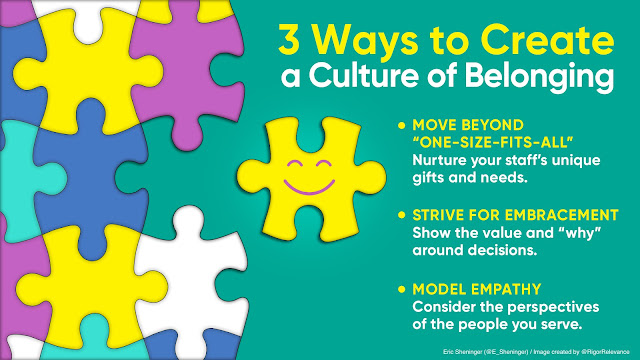Everyone wants to feel that they belong where they work. A culture of acceptance and respect can reap the rewards for all stakeholders. Hence, we have seen an increased emphasis on workplace diversity, equity, and inclusion (DEI) initiatives. Now, more than ever, getting people to feel valued is of utmost importance in the face of a myriad of challenges impacting morale. Susie Lee shared the following:
Studies have shown that a high sense of belonging at an organization was positively correlated with a 56% improvement in job performance and 75% fewer sick days. Employees have also told me that their sense of belonging is a key reason they want to work for the company.
Move beyond “one-size-fits-all.”
Just like the students you serve, your staff has unique gifts and needs. It is essential to look at how you cultivate and nurture these, respectively. Consider providing opportunities for staff to spread their wings by heading up committees, planning professional learning, and working side-by-side with you to develop new courses, electives, and schedules. Move away from drive-by professional development and blanket approaches to personalized, job-embedded models. Also, consider multi-faceted means of evaluation and feedback that genuinely support growth.
Strive for embracement
I have never been a fan of the term “buy-in” as it relies more on extrinsic as opposed to intrinsic means of motivation. As I shared in Digital Leadership, if you have to “sell” people on doing things differently or accepting a mandate, chances are your staff will never see the benefit of the change. The key is helping them see the inherent value of anything that is asked of them, especially large-scale change initiatives. There are many ways to empower your staff to embrace change, such as actively modeling what is expected, learning side-by-side with them, and using both data and research as a means for validation.
Model empathy
As a leader, people want you to understand what it is like to be in their shoes. Empathetic leaders work to provide time and support for staff so that they can do their job to the best of their ability. They are compassionate, flexible, show grace, and build people up by celebrating success.
As leaders, it is vital for us to imagine ourselves in the position of others as this gives us a better perspective on the challenges and feelings of those we are tasked to serve. Better, more informed decisions can result from “walking in the shoes” of those who will be most impacted by our decisions. The result is a better sense of belonging.
The benefits are clear because even leaders want to belong. Sally Boardman shared the following:
A sense of belonging is crucial to our life satisfaction, happiness, mental and physical health and even longevity. It gives us a sense of purpose and meaning.
As you look to implement, refine, or improve DEI initiatives, consider how they help to create a culture of belonging. With this in place, people will bend over backwards for students, each other, and you as a leader. Make the work a place where people want to be and perform their best.

Being a great leader within a school district requires many talents such as empathy. Understanding the needs for staff, faculty, and students allows a leader to provide support on different levels to ensure learning is happening in a way that meets the individual needs of our students. Leadership is being able to provide goals to your followers as well as setting an example to be followed that requires a process to build trust and establish shared goals (Walden University, 2007). I firmly believe that setting an example and working with your teachers to meet goals for our learners can provide the teachers with new ideas and motivation to continue their own learning. Continuously educating our teachers provides our students with new and innovative methods of learning and discovering.
ReplyDeleteReference:
Walden University, LLC. (Producer). (2007). Dynamic teacher leadership: Mindful leadership.
Baltimore, MD: Author.